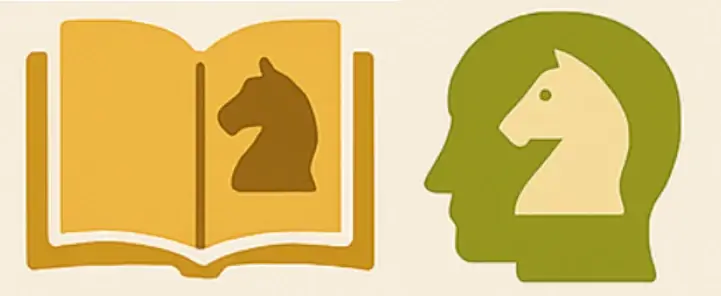Important Learning Practices Useful for Chess and Studying
Learn about the best basic learning practices that can serve you in any study, not just in chess.

If you study chess or any other subject on your own or teach your children or someone else, this article aims to provide you with the basics for better performance in your learning or teaching journey.
The information sources can be found at the end of this article, but the foundation comes from the video titled Optimal Protocols for Studying & Learning , created by Andrew Huberman, an american neuroscientist.
The Best Learning Practices
According to Andrew Huberman, the best learning practices are those that involve the components of our memorization system to counteract or avoid forgetting what we study.
Andrew tells us that successful learning practices are defined not by auditory, visual, or a combination of both means, but by the mechanisms involved in neuroplasticity.
Neuroplasticity is the ability of neurons and neural networks to modify their connections and behavior in response to a change or experience, such as learning new information, sensory stimulation, or dysfunction.
Following Andy, the main mechanisms by which we learn and memorize are:
-
Strengthening new connections (synaptic connections);
-
Preventing the weakening of connections between neurons;
-
And forming new connections between existing neurons.
Considering the above, to learn or retain new knowledge, keep these 4 practical aspects in mind (the first two are key):
-
Active attention
-
Deep sleep
-
Taking tests, exams, or exercises on what has been studied
-
Interspersing different information
Did you know that there is no universal optimal note-taking method?
Research on whether it is better to take notes with a pen or pencil or with a computer or digital devices is mixed. Both methods have advantages and disadvantages.
Taking notes with pen or pencil promotes encoding, processing, and storing information. Taking notes with a keyboard promotes organization and allows for faster information retrieval.
What has been shown is that taking notes in any form is significantly more effective for information retention than not taking notes. The most effective strategy would be to combine both methods, and this strategy should be personalized.

Learning Practice 1: Focus
When studying, you need to be focused on what you’re learning. You have to pay attention or actively engage your brain in the new information presented to you.
To do this, aim to be in a state of alertness, without distractions. This state tells your nervous system that the information you hear is important.
If you know that the new information is important, you voluntarily increase your state of alertness and concentration.
A little bit of effort and stress is good for improvement.
If you struggle to concentrate, keep the following in mind.
Practice Mindfulness Meditation for 5 to 10 Minutes
It is a behavioral tool to improve concentration.
In a quiet place, lie down or sit; close your eyes, focus on your breathing process: relax, inhale, and feel the air passing through your nose and into your stomach.
When your attention diminishes or disappears, repeat the process.
Hydrate
Hydration is important for brain cells to receive oxygen and nutrients and to help the glymphatic system clear the central nervous system.
Caffeine
Remember that children cannot consume caffeine and that teenagers should control the amount they ingest.
If you are an adult and caffeine is not a health problem for you, you can have a cup of coffee. Don’t drink it right after waking up in the morning, but 60 or 90 minutes later, when cortisol levels start to decrease.
Consuming caffeine when cortisol levels are high may have the opposite effect of what you desire, which is to feel focused and alert.
Did you know that when learning a language, the directionality of recall for the vocabulary list you want to learn is important?
Let’s say you speak Spanish and want to learn English:
1) If you try to recall how a Spanish word is said in English, you’ll be training the ability needed to speak in English conversations, although the cognitive process is more demanding.
2) If you try to recall how an English word translates into Spanish, you’ll be training the ability needed to recognize the word when reading or listening, and the process is faster since it requires less working memory load.
Keep this in mind the next time you make your word list and practice both methods.
Learning Practice 2: Sleep Well and Take Naps
Deep sleep is crucial for learning because during sleep, synaptic connections are strengthened, your body is physically repaired, and your immune system improves.
New information consolidates during the first night after learning occurs.
Naps also help with declarative memory, that is, long-term memory involving the recall of facts and events.

There are four stages of sleep, and a complete cycle takes between 90 and 120 minutes, although the progression of sleep stages is not linear.
The stages include: two stages of light sleep, deep sleep, and REM sleep (or rapid eye movement). If you want to know more, read the article on REM sleep .
You’ll have to experiment with the nap duration that gives you the best productivity, as there’s no agreement on what’s best.
If you’re going to study chess or any other subject, it’s important to have discipline, sleep well, and avoid staying up late before a test.
Yoga Nidra
A useful behavioral tool to improve neuroplasticity is practicing some form of deep rest without sleep (NSDR, which stands for “non-sleep deep rest”), like Yoga Nidra, for 10 or 20 minutes.
NSDR mimics brain wave frequency patterns observed during sleep. It’s known that when we achieve deep sleep, we consolidate our memory and improve cognitive function.
These exercises help your body bring your body and mind, your nervous system, into balance, which will improve your knowledge consolidation and learning process.
Did you know…?
According to a study conducted among 675 high-performing medical students, the most common learning habits among them include:
1) dedicating effective study time;
2) avoiding interruptions, such as from phones, family, or friends;
3) prioritizing activities based on goals;
4) studying 3 to 4 hours daily;
5) studying alone to retain information;
6) learning from multiple sources;
7) investing efficiently in technology;
8) contributing to teaching peers;
9) reviewing notes even if there’s no exam upcoming;
10) maintaining motivation through self-gratification and fulfilling family dreams.

Learning Practice 3: Test Your Knowledge
The best way to prevent quickly forgetting things is to constantly test what you’ve learned.
You choose how you want to test yourself (quizzes, flashcards, concept maps, summaries, teaching others, etc.). You can also use different memorization techniques .
The important thing is to test your knowledge immediately after learning new information. Don’t let time pass because you won’t get the same results.
When you test what you’ve learned, you have the opportunity to find your mistakes. Your nervous system will keep the correct information, and you can work on your mistakes.
Did you know…?
Regarding the type of questions, tests that ask for short answers improve learning and material retention, particularly in the early stages of learning, compared to multiple-choice questions or lesson summaries.
Learning Practice 4: Interleave Information
In this final learning practice, you interleave information that has some relationship to the blocks of the topic you’re learning.
More than one person will fondly remember the classes of teachers who could link two things that seemed completely unrelated.
Instead of presenting blocks of information on a specific topic and finding similarities, give yourself the opportunity to interleave information that helps you find differences between both topics.
Two concepts may be similar but not the same. When studying a concept, you can promote the discernment of these differences. The same can be done with works of art, chess positions, or any other subject.
In the end, the student will improve their memory through discerning differences and will have better results on the final test.
Additionally, this is a test and opportunity for the educator or teacher, who must help the student transfer knowledge or skills from one subject area to others.
Further reading
Ver el concepto de “neuroplasticidad” .
Study Habits of Highly Effective Medical Students (Advances in Medical Education and Practice), Khalid A Bin Abdulrahman (https://www.tandfonline.com/doi/full/10.2147/AMEP.S309535#d1e149) .
Omar Boukhris, Haresh Suppiah, Shona Halson, Suzanna Russell, Anthea Clarke, Mary C. Geneau, Luke Stutter, Matthew Driller, The acute effects of nonsleep deep rest on perceptual responses, physical, and cognitive performance in physically active participants .
Testing improves long-term retention in a simulated classroom setting, Andrew C. Butler and Henry L. Roediger, III (https://www.tandfonline.com/doi/abs/10.1080/09541440701326097) .
Vidal, V., Pretel, M.R., Capurro, L. et al. Short naps improve subsequent learning in a high school setting .
Lemos N, Weissheimer J and Ribeiro S (2014), Naps in school can enhance the duration of declarative memories learned by adolescents .
Jonathan Firth, Ian Rivers, James Boyle, 2021, A systematic review of interleaving as a concept learning strategy .
Abel, R., de Bruin, A., Onan, E. et al. Why Do Learners (Under)Utilize Interleaving in Learning Confusable Categories? The Role of Metastrategic Knowledge and Utility Value of Distinguishing .
Mueller, P. A., & Oppenheimer, D. M. (2014), The Pen Is Mightier Than the Keyboard: Advantages of Longhand Over Laptop Note Taking .
James KH, Engelhardt L., The effects of handwriting experience on functional brain development in pre-literate .
Wang Y, Yang K, Zhou S, Zhang H, Ma T, Shi X, Ma W., (2025), Bilingual Proficiency Effects on Word Recall and Recognition. Behavioral Sciences .
Francis WS, Baca Y. (2014),Effects of language dominance on item and order memory in free recall, serial recall and order reconstruction .
Healy AF, Schneider VI, Kole JA. (2025), Exploring Whether Making Second-Language Vocabulary Learning Difficult Enhances Retention and Transfer .
García-Gámez AB, Macizo P., (2022) Lexical and semantic training to acquire words in a foreign language: An electrophysiological study .
Healy AF, Schneider VI, Kole JA., (2025)Exploring Whether Making Second-Language Vocabulary Learning Difficult Enhances Retention and Transfer .
Wikipedia, Bilingual interactive activation plus .
Wikipedia, Bilingual memory .
Wikipedia, Bilingual lexical access .